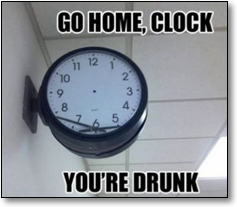 Here I am, once again, the day before Christmas wondering how I seemed to have missed the month of December. Where did that month that seemed to go on forever as a kid go? Why does it seem to get shorter every year? Is it just me?
Here I am, once again, the day before Christmas wondering how I seemed to have missed the month of December. Where did that month that seemed to go on forever as a kid go? Why does it seem to get shorter every year? Is it just me?
Time gets talked about a lot during the holidays. As the year winds down, it seems fitting to take stock of what has passed. In the days of yore we had to rely on our own memories to form those images. This year we have Facebook to thank for scraping together the highlights of our past year and putting our lives into a nice photo album for us. We are now as Facebook thinks we are. <sigh>But that speed thing – when did that start happening? As I have aged, my months seem to go faster though my minutes all feel the same. It seemed like forever between my first date as a teenager and my first kiss, yet it feels like only yesterday that my now college-aged children started high school. As you get older, chances are you will experience the same feeling of fleeting time. Take heart, there is a good scientific explanation and a way to counteract this phenomenon.
 Claudia Hammond, author of Time Warped, believes we have two distinct systems for measuring time – our prospective and retrospective clocks. Our prospective clock works with the current moment we are experiencing. The retrospective clock forms opinions about time in the past. When these two systems are aligned, everything seems normal. As we age, these two systems often get out of sync, causing a feeling that time is passing more quickly.
Claudia Hammond, author of Time Warped, believes we have two distinct systems for measuring time – our prospective and retrospective clocks. Our prospective clock works with the current moment we are experiencing. The retrospective clock forms opinions about time in the past. When these two systems are aligned, everything seems normal. As we age, these two systems often get out of sync, causing a feeling that time is passing more quickly.
Science has shown that our prospective clock doesn’t change much through our lives. A minute at age nine feels the same at seventy-five years old. We may have developed more patience or have a different perspective based on our physical condition, but the perception of that moment remains fairly constant. There is the occasional warping that Einstein reflected upon when he said, “When a man sits with a pretty girl for an hour, it seems like a minute, but let him sit on a hot stove for a minute and it’s longer than any hour.” However, over the course of our life, our perception of a minute remains constant. Therefore, if there is a mis-alignment between the two clocks, it must be our retrospective clock that is responsible for our feeling of fleeting time.
 You may recall a behavioral concept called the peak-end heuristic that we discussed in a previous Stranded Starfish column. The idea is that we tend to tend to store memories of our past events as a composite snapshot of how the event finished and the peak moment of the event, whether good or bad. My memory of zip-lining in Costa Rica, for instance, is stored away as the incredible elation I felt finishing the run and the moment I was sure I was going to pee my pants when I saw the first drop through the clouds.
You may recall a behavioral concept called the peak-end heuristic that we discussed in a previous Stranded Starfish column. The idea is that we tend to tend to store memories of our past events as a composite snapshot of how the event finished and the peak moment of the event, whether good or bad. My memory of zip-lining in Costa Rica, for instance, is stored away as the incredible elation I felt finishing the run and the moment I was sure I was going to pee my pants when I saw the first drop through the clouds.
The peak-end rule plays a part in our retrospective clocks as well. We tend to remember the past as a series of peaks. Our mind then wants to apply a linear time view of those peaks, even though we fully recognize they did not happen in even chunks of time. As a relative time-keeping device, the retrospective clock thinks of the span of time for 10 peak events when you were 20 the same as it does when you are 50.
The problem is that peak events happen at different rates in our lifetime. As a young kid there were so many “firsts.” We had our first kiss, our first day of high school, our first car, our first football game, our first love, and our first graduation all happen within a very short period of time. As we have aged, all of that wisdom we acquired came from the fact that we have so many firsts behind us. We are experienced. Our peaks are less frequent. As a kid, you may have had 20 major peaks in your life in one year. As an adult, it may take 10 years to gain 20 equivalently salient events. The retrospective clock, being the linearly errant beast that it is equates these as equivalent time spans, leading us to believe that time is speeding up.
 Is there anything we can do to change our perception and possibly lighten the anxiety? Yes, there is a simple solution. However, you may want to consider whether having this misinformed perception of time isn’t actually a good thing. The fact that time seems to be going faster is likely an indication that peaks aren’t as frequent. Remember, peaks can be both positive and negative events. The rush of time indicates that bad things are spaced out as well. You are likely experiencing calm waters. If that fits what you value, then congratulations. Laugh at your retrospective clock, knowing that it can’t fool you. Life is good and happening at the same rate as always.
Is there anything we can do to change our perception and possibly lighten the anxiety? Yes, there is a simple solution. However, you may want to consider whether having this misinformed perception of time isn’t actually a good thing. The fact that time seems to be going faster is likely an indication that peaks aren’t as frequent. Remember, peaks can be both positive and negative events. The rush of time indicates that bad things are spaced out as well. You are likely experiencing calm waters. If that fits what you value, then congratulations. Laugh at your retrospective clock, knowing that it can’t fool you. Life is good and happening at the same rate as always.
However, if having a smooth life seems contradictory to what you believe, then you need to create some peaks. You need to kick into another gear and create some new firsts. With all of your life experiences, you will have to work harder to find new peak events. Many create a list of firsts and call it their bucket list. Ironically, by speeding up the advent of new experiences you may make time appear to slow down.
Time is a wonderful illusion. So is perspective. The nice thing about illusions is that once we understand them, we can control them.






